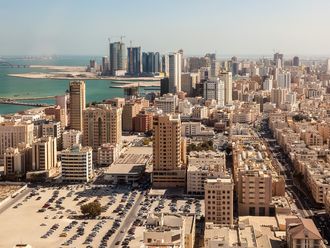
Manama: Bahrain's interior ministry officials said that Qatar's coastguard could have acted less forcefully when it dealt with a fishing boat that strayed into their waters.
Bahrain's strong condemnation of the incident, days after 37-year-old fisherman Adel Al Taweel was shot in the back, was an indication of the escalating tension between the two Gulf Cooperation Council (GCC) neighbours that have in the past been forced to resort to the International Court of Justice to settle a bitter border dispute.
"While there was no doubt that Adel Al Taweel broke the law, he could have been dealt with differently," Bahrain interior ministry undersecretary Tarek Bin Daina said.
"The shooting was unnecessary and extreme. We are not blaming the Qatar authorities for the shooting because we believe it may have been an individual decision," he told reporters in Manama.
The fishing boat could have been chased, caught and detained or it could have been immobilised and the crew apprehended, but that did not happen, he said.
Qatar's coastguards said they fired warning shots in the air to ask seven boats to leave and that only one boat, Al Taweel's, refused to comply, which prompted them to take action.
Al Taweel's sister said he was shot from close range and then taken to a Doha hospital for treatment.
She said her brother had been out fishing and was not involved in any illegal activity.
Bin Daina said that the GCC countries had signed an accord allowing their citizens to work in any of the six member states.
Bin Daina said all Gulf nationals were treated like Bahraini citizens in Bahrain.
"Qatar authorities have told us there were many smugglers and pirates active in the area and that the fisherman did not heed a warning to stop and that is why he was shot," Bin Daina said.
"It is very easy to stray into Qatari waters in the area so it may entirely be possible that he strayed accidentally.
"What we are saying is that shooting a man should be the ultimate last resort and in this case it was certainly unnecessary and an extreme step.".
Both Bahrain and Qatar needed to agree on measures and procedures to ensure the incident was not repeated, Bin Daina said.
King Hamad Bin Eisa Al Khalifa of Bahrain last week ordered that full medical care be given to Al Taweel, including that he be flown to Europe for further treatment.
A Bahraini medical crew which flew to Doha to repatriate Al Taweel was at first allowed to assess if he could be transported, but were told to leave the patient's room by police.
Al Taweel's family said the Bahraini fisherman, who had been told he could leave Doha, was then detained to face charges of entering Qatari waters illegally.
Relations between Bahrain and Qatar are being tested after Doha blocked the nomination of former information minister Mohammad Al Mutawa as the next GCC secretary general.
Qatar said that it backed up a Bahraini nominee for the post to become vacant after incumbent secretary-general Abdul Rahman Al Attiyah left at the end of his term, but insisted that it should not be Al Mutawa.
Al Mutawa was Bahrain's information minister when the two countries went to The Hague to solve their dispute, mainly over Hawar Islands.
Bahrain was adamant about nominating Al Mutawa, who is adviser to Bahrain's prime minister for cultural affairs.
At the GCC summit in Kuwait in December, the two countries had a brief standoff at the end of the meetings, with senior ministers from both capitals arguing their cases.
The two countries again have seemingly failed to agree on a name at the GCC advisory summit in Riyadh on May 11.
Bahraini officials refused to comment.












